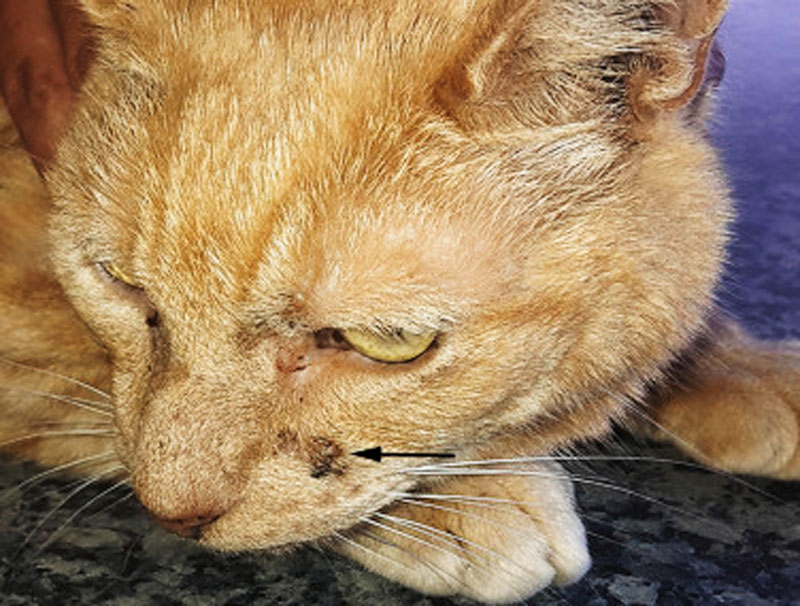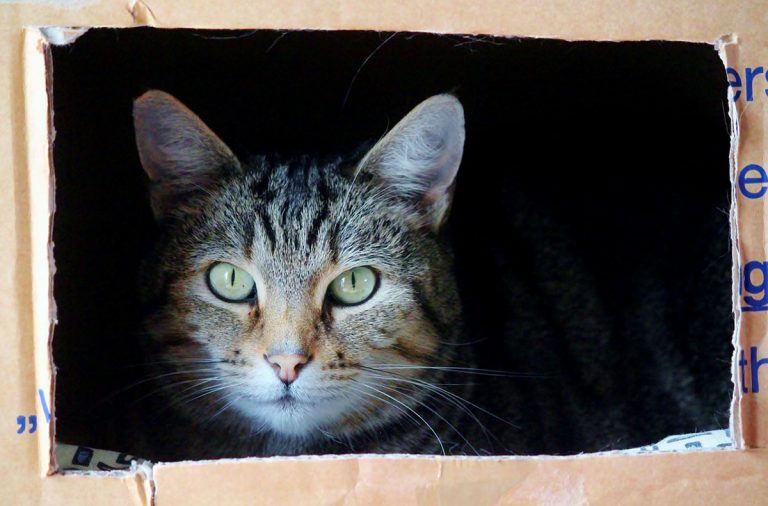You might have come across a small, dark bump on your cat’s skin and wondered: what is that? Do cats get warts? Or is it a pimple? Or… cancer?
It can be quite scary the first time you are confronted with Papillomatosis in cats. You can rest assured, however: your cat is not in any immediate danger. Read our guide on papillomavirus infection in cats to learn all you need to know about this feline skin condition and how to protect your cat from it.
DISCLAIMER: This post may contain affiliate links. If you click one of these links and decide to make a purchase, we may receive a small commission. This comes at no extra cost to you and helps to keep the site alive and up to date. If you want more information, please review our Privacy Policy. Thank you for your support!
Do Cats Get Warts?
Although it is much more common in dogs, cats are also known to develop warts, or papillomas, on their skin. They are caused by a viral infection of the basal layer of the skin, which is called Papillomatosis.
What Are Warts?
A wart is a benign growth, or lesion, that can appear on your cat’s skin. Warts are fairly rare in cats and therefore often go unrecognized by cat owners. They are mostly small, solid and might feel a bit crusty on the outside with a soft, malleable center, depending on their size.
Warts are not to be confused with pimples or cancerous growths. Pimples are generally smooth and fluid-filled, while warts are solid masses. Cancerous growths obviously distinguish themselves from warts by being malignant. They also tend to be more aggressive with a faster growth rate, larger size and a wider range of appearances (Ed. if you want to see pictures and aren’t too squeamish, check here).
Recognizing Papillomas
Warts can take different shapes. Sometimes they look like tiny polyps shooting up from your cat’s skin. Other times they are more flat and lie on top of the skin like a plaque. Papillomas have a dark color and a scaly texture. In rare cases they might break open and bleed a little, although this appears to be more common in dogs than in cats.
In lighter or less progressive cases of Papillomatosis a cat might present with one or two small lesions at a time, usually located on the face, neck or limbs. If the disease has progressed further, lesions can start to form in clusters. If this happens to your cat, it is key that you get them removed as soon as possible.

What Causes Papillomatosis In Cats?
Papillomatosis is caused by a range of viruses that are called papillomaviruses. These kinds of viruses occur in humans and in some animals, including felines. You’ll likely be familiar with HPV, or human papillomavirus, which is known to be the most common STD in humans.
About half of all domestic cats likely carry at least one type of papillomavirus on their skin. For an actual papillomavirus infection to occur the virus needs to spread to the basal layer of the skin.
Cats contract Papillomatosis from their surroundings through abrasions of the skin, for instance if they scratch themselves or get into a fight with another cat. Areas of their body where the skin gets softened by moisture are also at risk, like in and around the mouth, the ears and between the toes and the folds of the skin.
Cats with a weakened immune system are at a higher risk of developing an infection and actually getting skin lesions from papillomaviruses. Consequently, these dark, wart-like bumps and masses are mostly seen in older cats.
Related Post: Is Pet Insurance Worth It For Indoor Cats?
Is pet insurance worth it for indoor cats? Read this guide to learn about pet insurance for cats and calculate if it is really worth it for your indoor cat.Are Papillomas Dangerous?
A single papilloma generally doesn’t pose much of a threat. Depending on where it is located, your cat might experience some discomfort or trouble grooming the area, but it will not put them at any immediate risk.
Are Papillomas Painful?
Most papillomas aren’t painful. But if your cat keeps scratching at a wart, the skin can get irritated and may even break, which can cause some pain. Open wounds such as these should always be kept clean to avoid further infection. You can consider putting an anti scratch collar on your cat if they tolerate it.
In rare cases, secondary infections may occur, such as cysts or abscesses. These can definitely be painful and, in the case of an abscess, life-threatening. If you notice any bumps under the skin or fast-growing growths next to a wart, waste no time and take your cat to the vet immediately.
Related Post: Top 20 Feline Medical Emergencies: When To Take Your Cat To The Vet
We list the top 20 cat medical emergencies that require an immediate visit to the veterinary clinic. Read on to find out when to take your cat to the vet.Are Papillomas Contagious?
In general, papillomaviruses are species-specific, meaning that they cannot be transferred from one species to another. Your cat did not get their PV from you, and you are not at any risk of contracting PV from your cat.
Members of the same species, however, are able to transfer papillomaviruses to one another. If you have a multi-cat household and one of your cats has Papillomatosis, there is a good chance that your other cats are also carriers of the same virus and might develop an infection at some point.
Are Papillomas Cancerous?
You’ll be relieved to know that the lesions caused by the papillomavirus are benign. So you don’t need to worry about your cat having cancer when you find a small wart. At least, not immediately.
Papillomatosis in cats is definitely not something you want to ignore either. There is scientific evidence that connects feline papillomaviruses (PVs) to squamous cell carcinomas (SCCs), which are a type of cancer that can manifest in various organs, like skin, lungs and thyroid. Researchers have repeatedly found DNA belonging to PVs in SCCs, which leads them to believe that Papillomatosis is a possible precursor to cancer.
There is also some mitigating evidence to be found. It seems that PVs are present in about 52% of normal feline skin swabs, suggesting that they are simply omnipresent and therefore highly likely to be found in epidermoid tumors like the ones that were investigated. Nevertheless, until scientists can come to a definitive conclusion, it is best to be on the safe side and get your cat treatment for their Papillomatosis.
How To Treat Papillomatosis In Cats
When you first notice a wart on your cat, you might be tempted to wait and see if it goes away on its own. And in some cases it will in fact do that. Your cat can develop immunity to the papillomavirus, at which point the wart will start to go away.
However, given the possible connection between warts and skin cancer in cats, we advise you to not take any chances. There is no guarantee that your cat will actually become immune and, in the meantime, you are letting their viral load go through the roof. If you have multiple cats, you are putting them all at risk of getting infected.
Wart Removal
Your best defense against Papillomatosis in cats is simply getting your cat’s warts removed as soon as they pop up. Being fast and vigilant is the best way to minimize your cat’s discomfort and the risk of it leading to something more serious.
Your cat will have to be put under anesthesia for the wart to be removed. The vet needs to make sure that all infected tissue is cut away with clean margins to prevent regrowth, which would obviously be impossible to do if your cat was awake. In most cases, however, the procedure itself shouldn’t take that long and you will be able to take your cat home the same day.
If your cat is otherwise healthy, there is a reasonable expectation that they will not develop any new lesions after this. But if your cat is immunocompromised in some way, perhaps due to a secondary ailment, there is a chance that the papillomavirus infection will endure and cause new warts.
Cats that have had Papillomatosis will always need to be monitored for new infections. Luckily, you can easily do this yourself by regularly petting the heck out of them. They surely won’t mind this kind of aftercare.
Papillomavirus Vaccine
You might be wondering if there is a way to preemptively protect your cat from papillomavirus infections with a vaccine. After all, there is an HPV vaccine for humans.
Unfortunately, science hasn’t progressed to the point where we have PV vaccines available for domestic cats just yet. But studies are being done and preliminary results indicate that such a vaccine could possibly be developed to protect younger cats from contracting Papillomatosis.
A True Preemptive Strike
The best way to prepare yourself for any type of injury or illness in your pets is by getting pet insurance. Your pets are part of your family. They rely on you for care and protection, just like your children do. It makes perfect sense that you want to take precautionary measures to protect them in case something unfortunate happens.
Pet health care can get very expensive, very quickly. Especially if your pet is chronically ill and requires regular checkups. Unfortunately, this can leave loving cat owners with having to choose between their cat and a month’s rent.
You can protect yourself from this heartbreak by becoming a member of Eusoh. Eusoh is not so much a pet insurance, but more a community health plan for cats.
Normal pet insurance will cost you around 160 USD per month, which is why most pet owners opt out of getting it. With Eusoh, you only pay a 17 USD membership fee per pet per month.
On top of that, any costs that were declared by community members are paid for by other community members in the form of a care contribution. This basically means that the total amount spent is spread out evenly across the community, with a maximum of around 65 USD per member. Overall, Eusoh members end up paying tens to hundreds of dollars less for their pet health care each month!
Eusoh covers everything that a normal pet insurer covers, including hereditary conditions. What’s more, they do not impose rate increases as your pet gets older. All other well known pet insurers do increase their rates, which makes pet insurance for older pets extremely expensive. With Eusoh, you pay the same amount, no matter how old your pet is.
So, if you truly want to protect your cat, now and in the future, go check out Eusoh.










